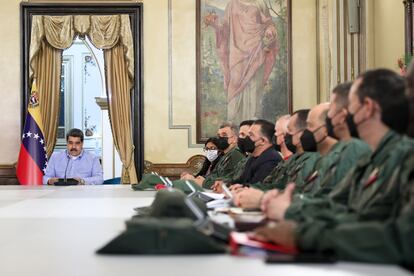Venezuela releases US prisoners after meeting with White House officials
The two countries have reinitiated diplomatic discussions to avert an energy crisis following Russia’s invasion of Ukraine

Venezuela has released at least two American prisoners in another gesture that underlines a rapprochement between the two countries, whose opposing stances appeared irreconcilable just a few days ago. Last week, emissaries from the administration of US President Joe Biden held a meeting with Nicolás Maduro to discuss energy security at a time when global oil prices are skyrocketing in the wake of the Russian invasion of Ukraine.
Maduro’s government had until now been Vladimir Putin’s staunchest ally in the western hemisphere. However, the change of course between Caracas and Washington, which remains in an exploratory phase, caught the entire world by surprise. Maduro has now gone a step further in this new understanding by releasing one of six executives at energy company Citgo who were arbitrarily detained in November 2017, as well as a Cuban-American arrested in 2021 in possession of a drone, for which he was charged with terrorism offenses.
Russia’s military assault on Ukraine has turned the global geopolitical context on its head. The US delegation that traveled in secret to Caracas was given the priority task of averting an energy crisis. The United States has banned imports of Russian petroleum and gas, one of a number of sanctions aimed at hitting the Kremlin directly in the pocket through its principal source of financing. As a result, Washington now needs to find other sources to meet its energy demands and that is where Venezuela comes into the picture.
In order to go about improving relations that until now were non-existent, the Biden administration laid out its demands for the release of the detainees. US Special Envoy for Hostage Affairs, Roger Carstens, had previously asked for the release of the six Venezuelan-Americans on medical grounds. Following the summit between US and Venezuelan representatives, it came to light that Carstens had been in Caracas negotiating their release in December and was included in the delegation that met with Maduro officials last weekend, remaining in the Venezuelan capital to await a decision from the government.
The case of the Citgo six has been a source of constant tension between Caracas and Washington. With every deterioration of relations between the US and Venezuela, Maduro’s government has made the conditions under which the six have been held increasingly harsher. In 2020, following a meeting between Donald Trump and opposition leader Juan Guaidó at the White House, house arrest was abruptly revoked and they were incarcerated at the El Helicoide prison in Caracas. They were later granted house arrest again, but the extradition of Álex Saab, Maduro’s alleged front man in Miami, saw the six returned to custodial conditions.
The executives were arrested in 2017 after being called to an emergency meeting of the state-owned energy company Petróleos de Venezuela (PDVSA) in Caracas. They were detained at the Maiquetía airport and transferred to the cells of the Directorate of Military Counterintelligence on charges of embezzlement, money laundering and criminal conspiracy for allegedly agreeing to refinance the debt of Citgo, PDVSA’s most valuable foreign asset. The detainees have always denied the charges and believe they were jailed for political motives.
Historical low in production
Maduro appears eager to take advantage of the crisis. On Monday, he stated that PDVSA is prepared to produce between one and three million barrels of oil per day if necessary. However, there are some doubts concerning the refiner’s ability to do so. PDVSA’s decline due to poor administration and US sanctions last year resulted in a historical low in terms of production. Analysts suspect that Venezuela is not yet equipped to supplant the market share enjoyed by Russia before the invasion of Ukraine.
Biden has warned the US that the sanctions being placed on Russia will not come free of charge to the American people, with the country currently experiencing its worst rate of inflationary escalation in 40 years. “Defending freedom is going to cost,” Biden said on Tuesday. The United Kingdom has also announced plans to phase out Russian oil imports during 2022, but the majority of European Union countries have not followed suit, given the huge dependency on Russian energy within the bloc.
Tu suscripción se está usando en otro dispositivo
¿Quieres añadir otro usuario a tu suscripción?
Si continúas leyendo en este dispositivo, no se podrá leer en el otro.
FlechaTu suscripción se está usando en otro dispositivo y solo puedes acceder a EL PAÍS desde un dispositivo a la vez.
Si quieres compartir tu cuenta, cambia tu suscripción a la modalidad Premium, así podrás añadir otro usuario. Cada uno accederá con su propia cuenta de email, lo que os permitirá personalizar vuestra experiencia en EL PAÍS.
¿Tienes una suscripción de empresa? Accede aquí para contratar más cuentas.
En el caso de no saber quién está usando tu cuenta, te recomendamos cambiar tu contraseña aquí.
Si decides continuar compartiendo tu cuenta, este mensaje se mostrará en tu dispositivo y en el de la otra persona que está usando tu cuenta de forma indefinida, afectando a tu experiencia de lectura. Puedes consultar aquí los términos y condiciones de la suscripción digital.








































